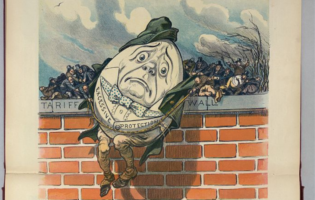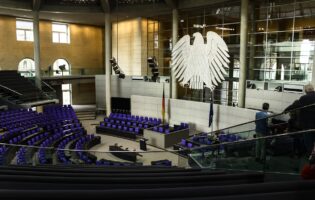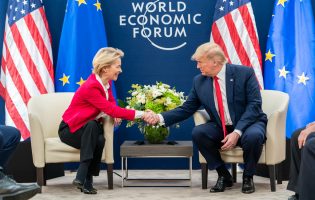
Feelpic / istock photo / BITKOM / Ich
Cooperation or Division? The German-American Relationship in a Changing World

Anne Jenichen
Aston University
Anne Jenichen is Lecturer (Assistant Professor) in Politics and International Relations at the Aston Centre for Europe, Aston University, Birmingham, UK. Her research focuses on the political impact of international norms and organizations; European human rights policy; the rights of disadvantaged groups, such as women and religious minorities; and on the politicization of religion in Europe. She holds a Diploma (equivalent to an MA) in Political Science from Free University Berlin and a Doctoral Degree in Political Science from the University of Bremen, Germany, where she also taught political science and European studies before joining Aston. She was Volkswagen Foundation Fellow at the Transatlantic Academy in Washington, DC (2014-15), Visiting Research Fellow at the Institut d‘Études Européennes, Université Libre de Bruxelles (2011), Research Fellow at the United Nations Research Institute for Social Development (UNRISD) in Geneva (2007-09), and Visiting Fellow at the Department of Sociology and Anthropology, Northeastern University, Boston (2007). For the Heinrich Böll Foundation in Berlin, she coordinated an international research project on “Religion, Politics, and Gender Equality” (2007-2010).
She is a 2018-2019 participant in AICGS’ project “A German-American Dialogue of the Next Generation: Global Responsibility, Joint Engagement,” sponsored by the Transatlantik-Programm der Bundesrepublik Deutschland aus Mitteln des European Recovery Program (ERP) des Bundesministeriums für Wirtschaft und Energie (BMWi).

Danielle Piatkiewicz
The German Marshall Fund of the United States
Danielle Piatkiewicz is a program coordinator for The German Marshall Fund of the United States’ (GMF) Asia and the Future of Geopolitics program. In these roles, she is responsible for managing and coordinating the Asia program’s portfolio on U.S. and EU relations with China, Japan, and India on economic, trade, security, and defense issues. In addition, she manages the Future of Geopolitics program which examines the emerging challenges to the liberal international order through convening and research to explain current political and societal trends in the United States to a Europe. She works on various leadership development projects at GMF including organizing the Young Professionals Summit at GMF’s flagship event, the Brussels Forum, and the Emerging Leaders program at Atlantic Dialogues.
Previously, she worked as a program assistant in GMF’s Wider Atlantic program in Brussels and program intern in Warsaw. Before joining GMF, she worked for the European Institute of Peace in Brussels (EIP) where she assisted with the logistical and operational set up of EIP as well as provided research and analysis on future peace mediation actors and regions. She holds an MA in international and political studies with a concentration in transatlantic studies from Jagiellonian University in Krakow, Poland. She received her BA in political science with an emphasis in international relations and a minor in German studies from the University of California, Santa Barbara (UCSB).
She is a 2018-2019 participant in AICGS’ project “A German-American Dialogue of the Next Generation: Global Responsibility, Joint Engagement,” sponsored by the Transatlantik-Programm der Bundesrepublik Deutschland aus Mitteln des European Recovery Program (ERP) des Bundesministeriums für Wirtschaft und Energie (BMWi).
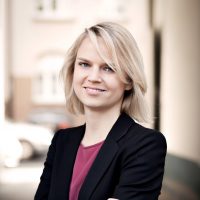
Ines Wagner
Norwegian Institute for Social Research
Ines Wagner is Research Professor at the Institute for Social Research in Oslo, Norway. Her research focuses on equal pay for work of equal value, the double mobility of capital and labour in the European single market, and technological change and the quality of work. She has held fellowships at the American Institute for Contemporary German Studies at Johns Hopkins in Washington, the Max Planck Institute for the Study of Societies in Cologne, and the European University Institute in Florence. Professor Wagner has published with, amongst others, Cornell University Press and in popular media outlets such as The Guardian and Harvard Business Review.

Melissa K. Griffith
Johns Hopkins School of Advanced International Studies
Dr. Melissa K. Griffith is a Lecturer in Technology and National Security at the Johns Hopkins School of Advanced International Studies (SAIS), affiliated faculty with the Alperovitch Institute at Johns Hopkins SAIS, and a Non-Resident Research Fellow at the University of California, Berkeley’s Center for Long-Term Cybersecurity (CLTC). From cybersecurity to tech security, Griffith works at the intersection between technology, national security, and economic statecraft with a specialization in cybersecurity, semiconductors, and machine learning/artificial intelligence. Prior to joining Johns Hopkins SAIS, she was the Director of Emerging Technology and National Security and a Senior Program Associate with the Woodrow Wilson Center’s Science and Technology Innovation Program (STIP); a Pre-Doctoral Fellow at Stanford University’s Center for International Security and Cooperation (CISAC); a Visiting Scholar at George Washington University's Institute for International Science and Technology Policy (IISTP); a Visiting Research Fellow at the Research Institute on the Finnish Economy (ETLA) in Helsinki, Finland; and a Visiting Researcher at the Université Libre de Bruxelles (ULB) in Brussels, Belgium. She holds a Ph.D. and an M.A. in Political Science from the University of California, Berkeley, and a B.A. in International Relations from Agnes Scott College. For additional information (including a comprehensive list of publications, prior positions and affiliations, presentations and public appearances, and teaching experience) please visit www.melissakgriffith.com.
She was a 2018-2019 participant in AGI’s project “A German-American Dialogue of the Next Generation: Global Responsibility, Joint Engagement,” sponsored by the Transatlantik-Programm der Bundesrepublik Deutschland aus Mitteln des European Recovery Program (ERP) des Bundesministeriums für Wirtschaft und Energie (BMWi).

Philipp Stelzel
Duquesne University
Philipp Stelzel studied modern European and German history at Ludwig-Maximilians-Universität München, Columbia University (MA), and the University of North Carolina at Chapel Hill (PhD). He has taught at Duke University, Boston College, and has been assistant professor of history at Duquesne University, Pittsburgh, since 2014.
His research focuses on post-1945 German and German-American intellectual and political history, historiography, and transnational history. His first book, History after Hitler: a Transatlantic Enterprise (Intellectual History of the Modern Age series of University of Pennsylvania Press, 2018) analyzes the intellectual exchange between German and American historians of modern Germany from the end of World War II to the 1980s.
His current project, Oppressing the Majority, is a contribution to the history of the global phenomenon of populism. It explores the trajectory of an argument that simultaneously emerged in Western Europe and the United States in the late 1960s and early 1970s, namely that a number of different actors, including political elites, activists, and the media, oppressed the voices of the "silent majority" of the respective populations. Oppressing the Majority follows the argument's trajectory in West Germany, Great Britain, and the United States in the subsequent four decades and places it in the political, socio-economic, and cultural context of these countries.
He is a 2018-2019 participant in AICGS’ project “A German-American Dialogue of the Next Generation: Global Responsibility, Joint Engagement,” sponsored by the Transatlantik-Programm der Bundesrepublik Deutschland aus Mitteln des European Recovery Program (ERP) des Bundesministeriums für Wirtschaft und Energie (BMWi).
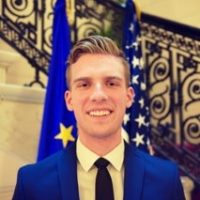
Thomas Hanley
Global Public Policy Institute
Thomas Hanley is a research assistant with the Global Public Policy Institute (GPPi) in Berlin, where he provides research and project support to the institute’s work on multilateral coalition building, the changing global order, technological sovereignty issues, and authoritarian challenges to liberal democracies. During the 2017-2018 academic year, Mr. Hanley taught at the Catholic University of Eichstätt-Ingolstadt as a graduate assistant, and was an Atlantic Expedition Fellow with the Berlin-based Atlantische Initiative, an organization working to improve transatlantic relations.
Mr. Hanley holds a Bachelor’s degree in political science from Boston College, where his thesis examined the relationship between European radical right-wing parties and xenophobic violence. He speaks English and German, and has previous work experience with the United States Department of State in Brussels, Belgium and with R/GA Digital Advertising, working on its Nike account in London, England.
He is a 2018-2019 participant in AICGS’ project “A German-American Dialogue of the Next Generation: Global Responsibility, Joint Engagement,” sponsored by the Transatlantik-Programm der Bundesrepublik Deutschland aus Mitteln des European Recovery Program (ERP) des Bundesministeriums für Wirtschaft und Energie (BMWi).
Policy Report 70
AGI is pleased to present the written results of the third and final year of its project “A German-American Dialogue of the Next Generation: Global Responsibility, Joint Engagement.” The six authors together with several other young Americans and Germans engaged with each other during the course of 2018-2019 in discussions to identify solutions to global issues of concern for the transatlantic relationship. The purpose of the project is to emphasize the important role of the next generation of transatlantic leaders and experts and to give them a platform and voice in the critical dialogue of crucial global issues that require joint transatlantic attention and solutions.
The project participants come from a variety of disciplines and have a wide array of expertise. Representing the three AGI program areas—Foreign & Domestic Policy; Geoeconomics; and Society, Culture & Politics—the participants formulated a set of recommendations that were presented in a variety of venues and through innovative means. The essays presented in this Policy Report summarize the outcome of a year-long engagement with current critical transatlantic issues, which include challenges and opportunities related to the digital transformation, the future of work and education of the workforce, the rise of China as a global player, the growing influence of Russia, populism, the energy transition, European defense capabilities, transatlantic security cooperation, the inclusion of minority and immigrant populations, as well as the role of civil society in strengthening the transatlantic alliance.




